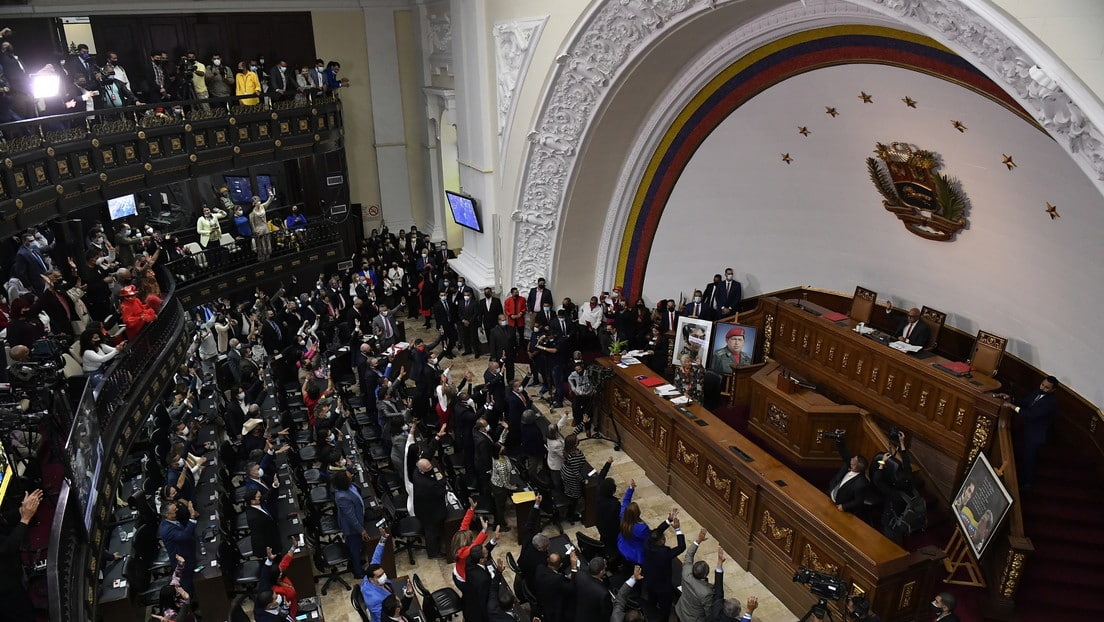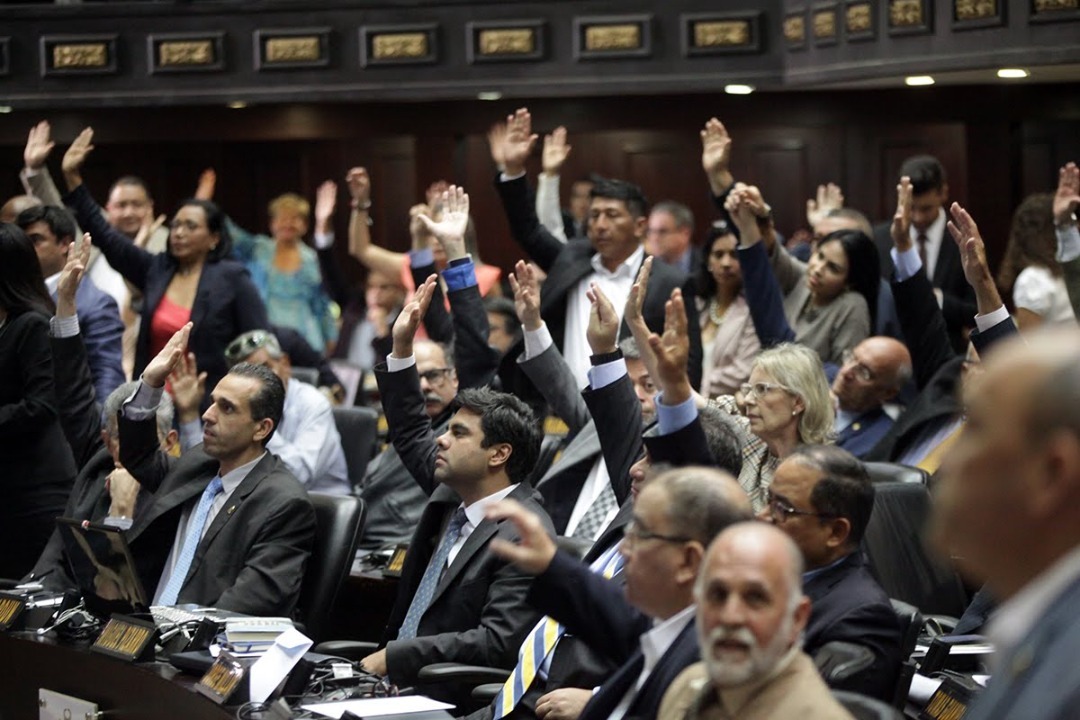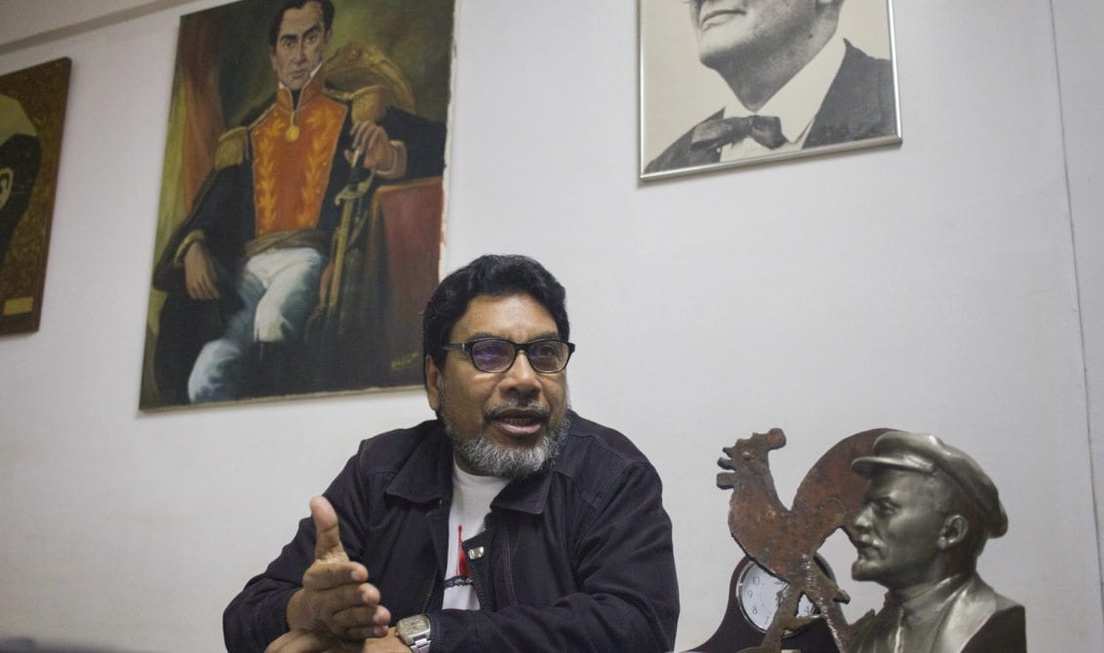
Venezuelan National Assembly during a plenary session in Caracas. Photo: Matias Delacroix/AP.

Orinoco Tribune – News and opinion pieces about Venezuela and beyond
From Venezuela and made by Venezuelan Chavistas

Venezuelan National Assembly during a plenary session in Caracas. Photo: Matias Delacroix/AP.
The legal instrument was approved with the vote of the deputies of the opposition and the government, but was rejected by the Communist party deputy.
Venezuela seeks to obtain financial assets in various ways. With this objective, the National Assembly recently approved the Organic Law of Special Economic Zones (ZEE), an instrument intends to increase the country’s income and encourage “economic independence,” according to its promoters.
Beyond the fact that the law was approved in consensus by the government and opposition benches (with the negative vote of the only communist deputy), the law establishes conditions for an exceptional fiscal regime that is viewed with skepticism by certain sectors, who have failed to consider Venezuela’s dire economic reality, a direct result of US and European imperialist aggression, sanctions, and economic blockade.
However, the government’s priority is clear: to support the recovery and diversification of the economy to counteract the severe sanctions regime imposed by the US and the European Union against Caracas, which has affected its productive apparatus for years.

Why does the government seek assets?
The sanctions imposed against Venezuela and the drop in the price of oil on the international market caused the country to lose 99% of its foreign-exchange earnings. The Central Bank of Venezuela (BCV), which in 2013 reported an income of more than $56.6 billion, began to record a continuous decrease in income from 2014-2020.
In 2014, revenue was $39.6 billion, but the following year it barely reached $13.5 billion. The lowest point was 2020, when the contributions of state companies totaled only $477 million.
Thus, Venezuela’s BCV lost some $56 billion in 2020 when compared to its 2013 revenue. This figure is higher than the $50 billion approved by the International Monetary Fund (IMF) to “end” the global COVID-19 pandemic.
RELATED CONTENT: National Assembly of Venezuela Approves Special Economic Zones Law
What are SEZs?
SEZs are geographical spaces regulated by Venezuela that have special conditions for their activity, which can be attractive for foreign investment because incentives of various kinds are offered (legislative, tax, customs, etc.).
These geographical areas are usually located in ports, airports, borders, places with deposits of natural resources, industrial zones, and even specialized companies.
With its entry into force, the Venezuelan government seeks to attract much-needed financial resources that are not available locally or in traditional financial markets, to diversify the economy, develop its industry, supply the national market, and increase exports, with a view to reducing its near-complete dependency on the oil industry.
Economist, deputy, and president of the Finance and Economic Development Commission of the Venezuelan parliament, Jesús Faría, has explained on several occasions that the SEZs are not synonymous with a free market or a territory to apply “neoliberal theories,” but that they will function as “engines” to transform the Venezuelan economy and promote the improvement of infrastructure, roads, and services in the regions where they are located.
The Venezuelan case takes into account previous experiences of countries such as China, Vietnam, Singapore, and South Korea, which also had problems accessing foreign exchange and were forced to diversify exports and industrial investment to reactivate their productive apparatus, repair the deficit, and escape economic stagnation.
What are the reviews
Although the government defends the urgency of accessing more foreign currency, the SEZ project has not been exempt from criticism. Deputy Oscar Figuera, Secretary General of the Venezuelan Communist Party (PCV), a political organization perceived to align itself increasingly with far-right political parties in recent years, explained in statements to Tribuna Popular —PCV’s media outlet— that his caucus had not supported the law in Parliament because he considered it an “instrument contrary to national and popular sovereignty.”
For Figuera, the regulation constitutes “a new threat” because “it creates the conditions to establish areas under the control of large transnational capital,” through special regulations, which imply not only tax exemptions but also “flexibility and deregulation of labor relations to the detriment of workers.”

The PCV deputy described the regulation as “a new elite pact,” a position that his party has maintained since parliamentary debates on the law began in 2021, revealing a lack of dialectical analysis on the causes of the necessity of the law, and forgetting that the first proponent of the initiative was former President Hugo Chávez.
RELATED CONTENT: Special Economic Zones: Venezuela’s Strategy for Breaking the US Encirclement
On the other hand, the government insists that this legal instrument will allow it “to restore, strengthen, and consolidate the necessary legal security for public, private, and mixed national and international investment,” as President Nicolás Maduro said in mid-2021 when the law was approved in its first discussion.
According to the Venezuelan president, the entry into force of the regulation aims only to boost the economic life of the country. On other occasions, Maduro had anticipated that the negotiation would not be easy, because it was not a “law for complacency,” but an instrument “to lay down the tracks for a new model of national development,” that increasingly looks at China and Vietnam’s experiences as models for development.
#EnVideo📹| Integrante de la Comisión de Finanzas de la AN, @LoboMRamon detalló que la Ley de Zonas Económicas Especiales es un espacio territorial con potencialidad de inversión, desarrollo, productos y servicios que cubran el mercado interno y generen divisas.#MáximaMoral pic.twitter.com/IU56jXe5Ln
— VTV CANAL 8 (@VTVcanal8) July 4, 2022
After the law was approved, PSUV deputy Ramón Lobo explained to the state media outlet VTV that SEZs are territorially delimited geographical spaces that “seek to attract investment to develop potentialities and convert them into products and services with greater added value,” through “the diversification of the economy,” to supply domestic demand and earn foreign exchange earnings through exports.
Lobo assured that the law also offers the “balance” that the country needs, based on “a win-win strategy,” since it facilitates actions by the executive “to overcome the situation of unconventional war, economic war and commercial blockade” that Venezuela faces.
What is missing for it to come into force?
Although the law has already been approved by the majority of the parliamentarians that make up Venezuela’s National Assembly, the government authorities still need to define how many SEZs there will be and where the first SEZs will be located, before the regulation may come into force.
In Venezuela, there are several states that the authorities have suggested as options in which to create SEZs. Most of them are located in coastal or border regions, or in areas easy access to important industrial zones.
After being authorized by the Venezuelan parliament, the Organic Law of the SEZ was sent to the Constitutional Chamber of the Supreme Court of Justice (TSJ), so that the highest court could analyze the regulation and confirm its constitutionality, in accordance with Article 203 of the Venezuelan Constitution.
If the courts, which have 10 days to issue their decision, approves it, the law will pass into the hands of the executive, which must also issue its approval within a period not exceeding 180 days.
(Actualidad RT) with Orinoco Tribune content
Translation: Orinoco Tribune
OT/JRE/SL